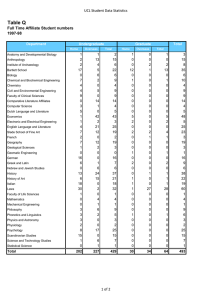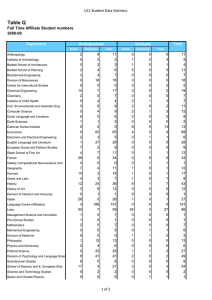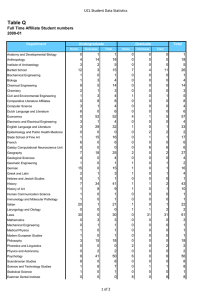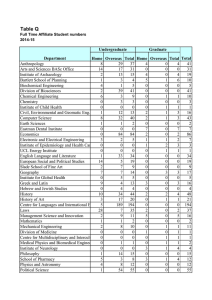TAXATION OF AMERICANS WORKING OVERSEAS
advertisement
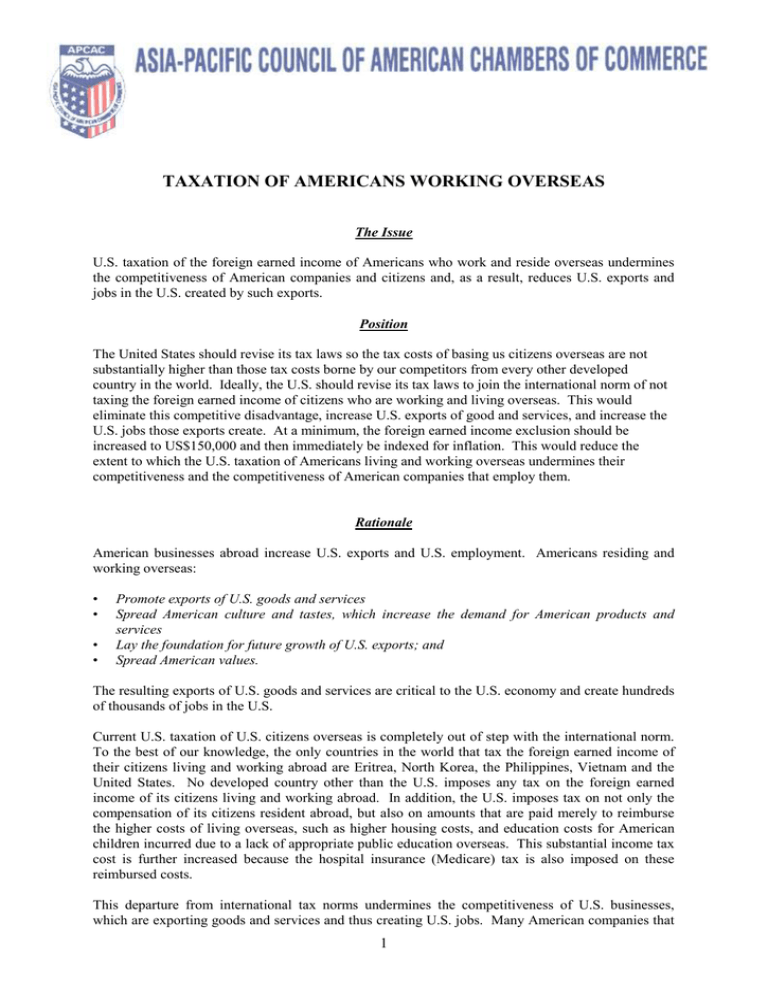
TAXATION OF AMERICANS WORKING OVERSEAS The Issue U.S. taxation of the foreign earned income of Americans who work and reside overseas undermines the competitiveness of American companies and citizens and, as a result, reduces U.S. exports and jobs in the U.S. created by such exports. Position The United States should revise its tax laws so the tax costs of basing us citizens overseas are not substantially higher than those tax costs borne by our competitors from every other developed country in the world. Ideally, the U.S. should revise its tax laws to join the international norm of not taxing the foreign earned income of citizens who are working and living overseas. This would eliminate this competitive disadvantage, increase U.S. exports of good and services, and increase the U.S. jobs those exports create. At a minimum, the foreign earned income exclusion should be increased to US$150,000 and then immediately be indexed for inflation. This would reduce the extent to which the U.S. taxation of Americans living and working overseas undermines their competitiveness and the competitiveness of American companies that employ them. Rationale American businesses abroad increase U.S. exports and U.S. employment. Americans residing and working overseas: • • • • Promote exports of U.S. goods and services Spread American culture and tastes, which increase the demand for American products and services Lay the foundation for future growth of U.S. exports; and Spread American values. The resulting exports of U.S. goods and services are critical to the U.S. economy and create hundreds of thousands of jobs in the U.S. Current U.S. taxation of U.S. citizens overseas is completely out of step with the international norm. To the best of our knowledge, the only countries in the world that tax the foreign earned income of their citizens living and working abroad are Eritrea, North Korea, the Philippines, Vietnam and the United States. No developed country other than the U.S. imposes any tax on the foreign earned income of its citizens living and working abroad. In addition, the U.S. imposes tax on not only the compensation of its citizens resident abroad, but also on amounts that are paid merely to reimburse the higher costs of living overseas, such as higher housing costs, and education costs for American children incurred due to a lack of appropriate public education overseas. This substantial income tax cost is further increased because the hospital insurance (Medicare) tax is also imposed on these reimbursed costs. This departure from international tax norms undermines the competitiveness of U.S. businesses, which are exporting goods and services and thus creating U.S. jobs. Many American companies that 1 hire Americans for overseas assignments bear this additional U.S. tax cost through "tax equalization agreements." Under such an agreement, the employer reimburses the American employee for the amount by which the employee's total U.S. taxes (income and Medicare) exceed the taxes that the employee would have paid if the employee had remained in the U.S. This puts the American company at a cost disadvantage to its non-U.S. competitor. It also puts the American citizen seeking employment with such a company at an economic advantage compared to qualified personnel who are not U.S. citizens. This explains in part why American companies operating in many jurisdictions are filling key overseas managerial positions with non-Americans. The U.S. foreign earned income exclusion, contained in Section 911 of the Internal Revenue Code, partially ameliorates the effects of the U.S. approach of taxing the worldwide income of Americans living and working overseas. Under Section 911 a U.S. citizen working and residing overseas is entitled to exclude from U.S. income tax a portion of foreign earned income. The exclusion amount was $80,000 in the early 1980’s, then reduced to $70,000, until the late 1990’s, and has over the past few years risen to its current level of $80,000. Given the extent of inflation over this period the exclusion amount would need to at least double to be equivalent in real value to the amount excluded twenty years ago. If the foreign earned income exclusion is not increased overseas jobs will not disappear - they simply will be filled by non-Americans. The loss of Americans in key overseas positions would result in a reduction of American exports and a reduction in the U.S. jobs that are created by those exports. No American economic or strategic interest is advanced by having less Americans working and living overseas. Indeed, the presence of Americans overseas enhances U.S. interests. 2

